Loukoumi, the beloved treat now synonymous with Syros, was first brought over by refugees fleeing the Chios massacre in 1822. The survivors arrived carrying their culinary traditions, including the recipe for loukoumi (also known as Turkish delight), which soon flourished on the island. Today, the sweet stands as a symbol of cultural resilience, embodying the shared heritage and spirit of the people who sought refuge and built new lives on the island.
“When we were kids, as soon as the fire under the last cauldron was extinguished, we would head straight to the beach to swim, still covered in sugar. Other bathers joked that the sea would taste sweeter after we arrived,” recalls Dina Sikoutri, a loukoumi maker since childhood.
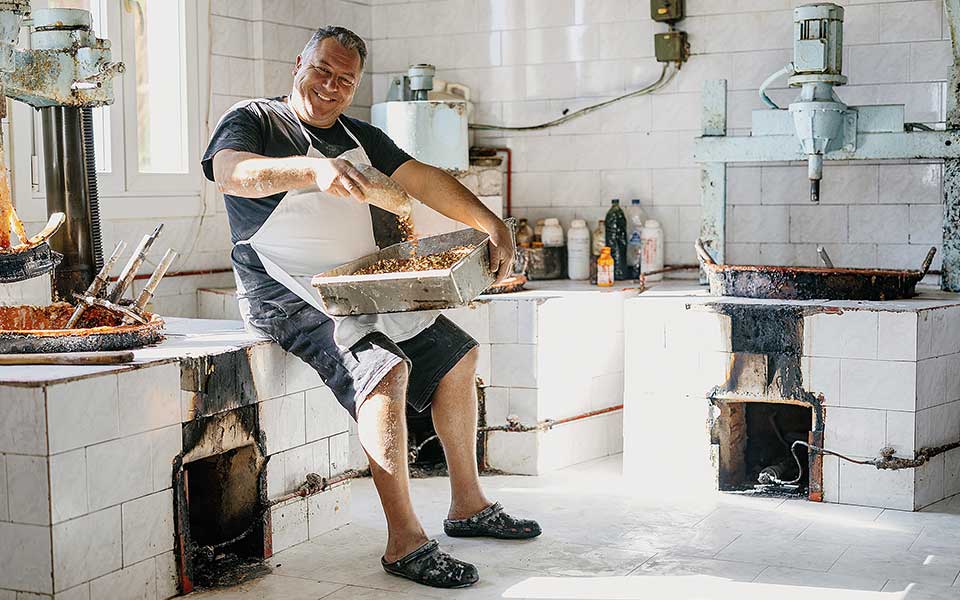
© Angelos Giotopoulos
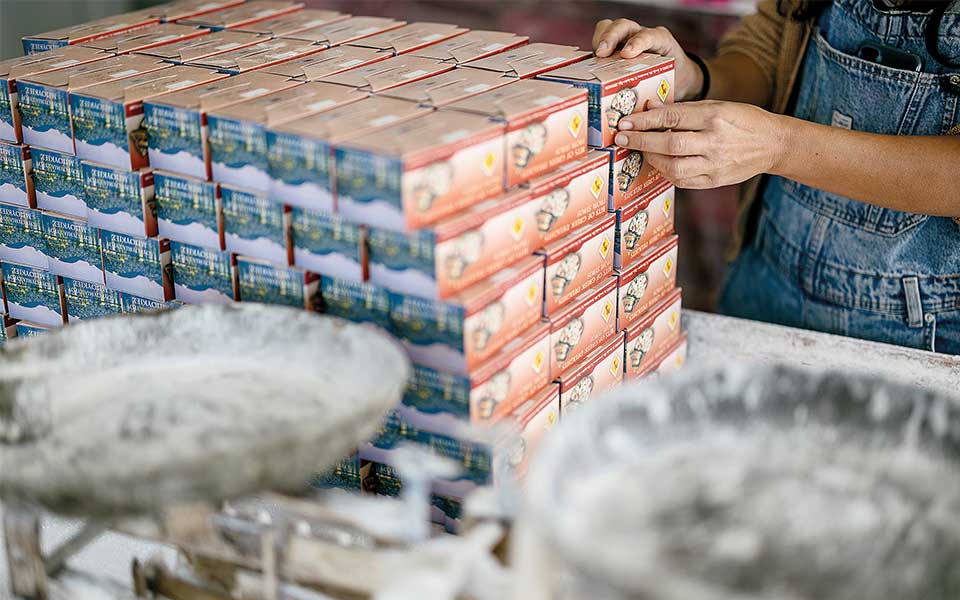
© Angelos Giotopoulos
From 1922 to the mid-1970s, the children of loukoumi makers formed an extensive group. Production was not limited to specialized confectioners, but included the 128 pastry chefs who were registered as of 1945 (compared to 55 listed in an 1870 census). The presence of most of these producers on the island was the result of two waves of refugee arrivals in 1822 and 1922.
In the Historical Archives of Ermoupolis, the first documented loukoumi maker is listed as Georgios Arfanis from Ephesus, while the earliest loukoumi maker’s stamp dates to 1837, belonging to Nikolaos Stamatelakis from Constantinople.
Initially, the refugees set up makeshift loukoumi workshops in the courtyards of their homes. As Ermoupolis grew, these workshops moved to the port area, facilitating trade and sales to travelers. The fronts of the workshops served as retail spaces, while production took place in the back.
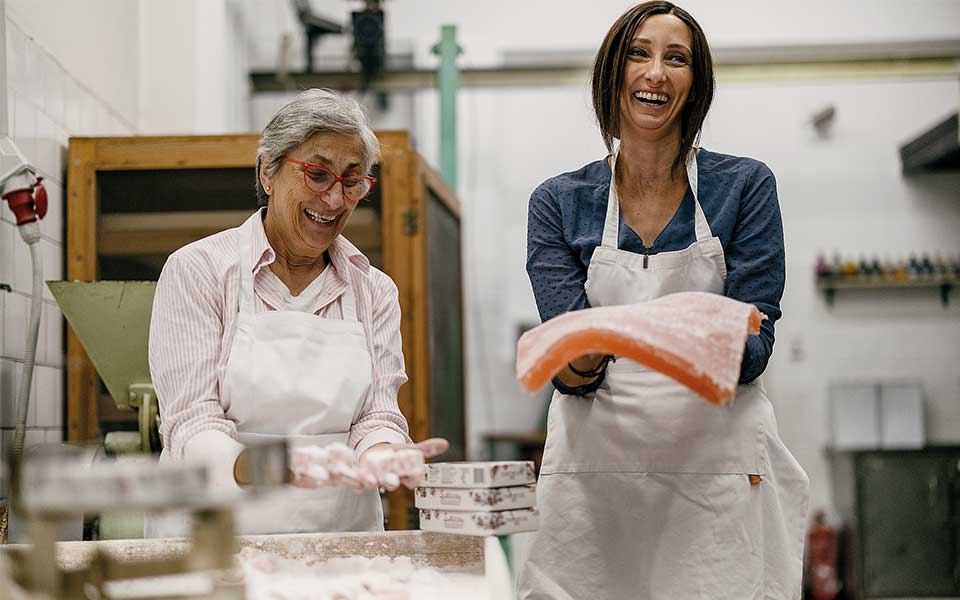
© Angelos Giotopoulos
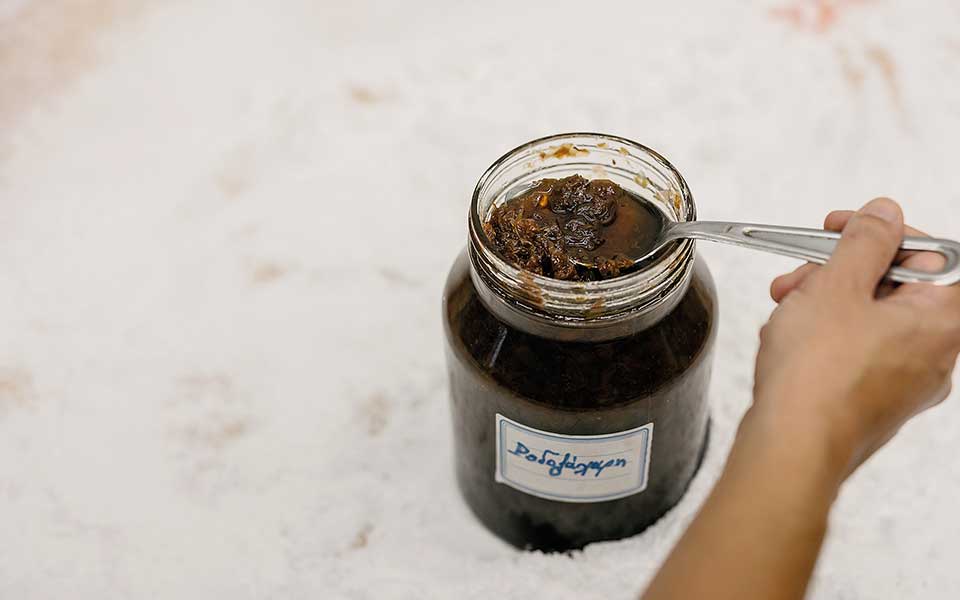
© Angelos Giotopoulos
A Tale of Two Centuries
Despite its sweetness, loukoumi is deeply intertwined with a bitter history of displacement and individual tales of loss and forced migration. Now spanning over 200 years, the history of loukoumi production in Syros is as old as Ermoupolis itself. Knowledge brought by the refugees was shared with locals, establishing a tradition that quickly gained fame beyond the island’s shores.
A thriving industry emerged around loukoumi that supported box makers, lithographers, designers, vendors who would sell it aboard visiting ships, and even an entire starch factory founded in 1905 under the name Georgios Papandreopoulos & Co. “Luxury loukoumi” was how the product was typically described on the elaborately decorated boxes in which it was packaged. In the “Loukoumi Corner” of the Industrial Museum of Ermoupolis, many items from this period are now on display including candy boxes, manufacturers’ stamps, photographs, and more collected by Ms Sikoutri.
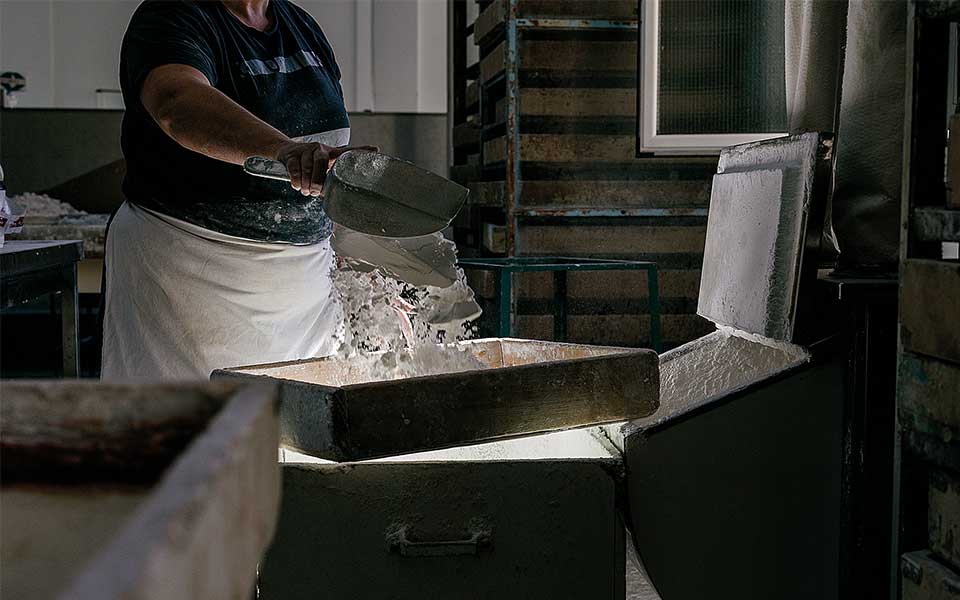
© Angelos Giotopoulos
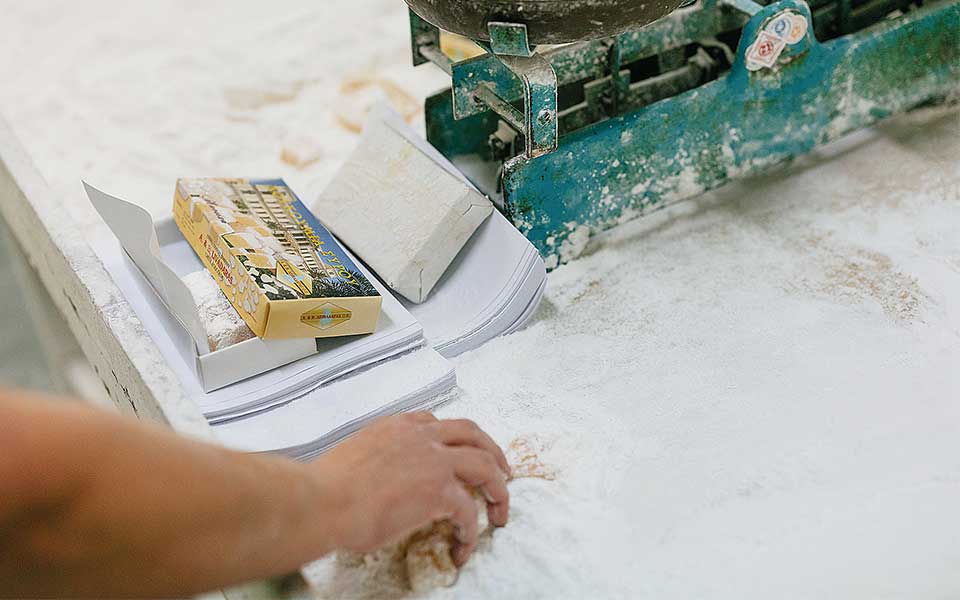
© Angelos Giotopoulos
Craftsmanship and Tradition
Locals attribute the distinct taste of Syros loukoumi to the brackish water from the spring of Aghios Athanasios in Ano Syros. Over time, it became the island’s top export and one of the first of the nascent Greek state. Samples of the confection were sent to international food exhibitions where it was awarded multiple distinctions. On the island, loukoumi became a staple offering at weddings, baptisms, and funerals. And from the 1940s onwards, it became part of the morning routine for factory workers who enjoyed psathouraki (an anise-flavored bread roll) filled with loukoumi before the horn blew commencing the day’s shift.
In 2019, loukoumi was officially added to Greece’s National Inventory of Intangible Cultural Heritage.
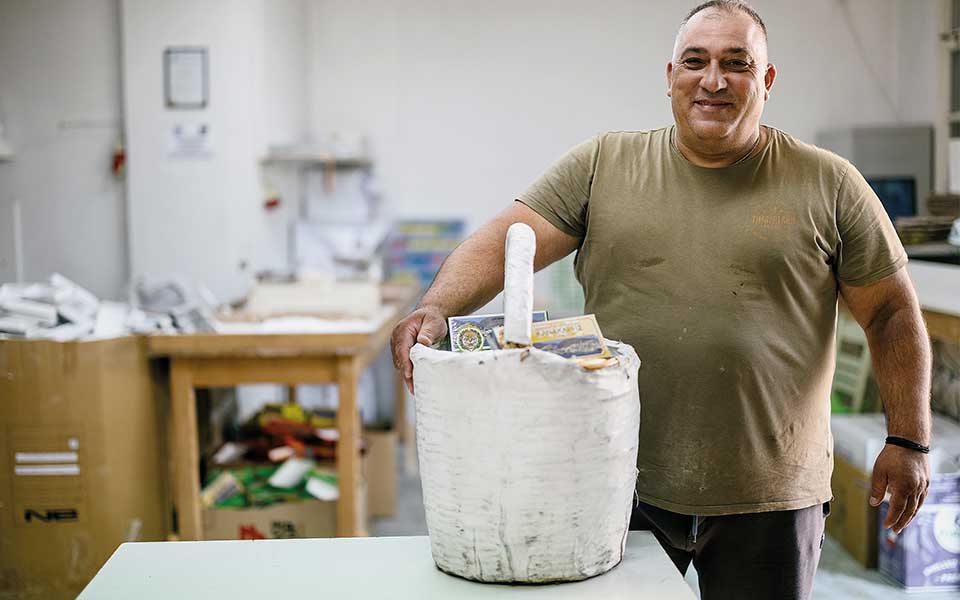
© Angelos Giotopoulos
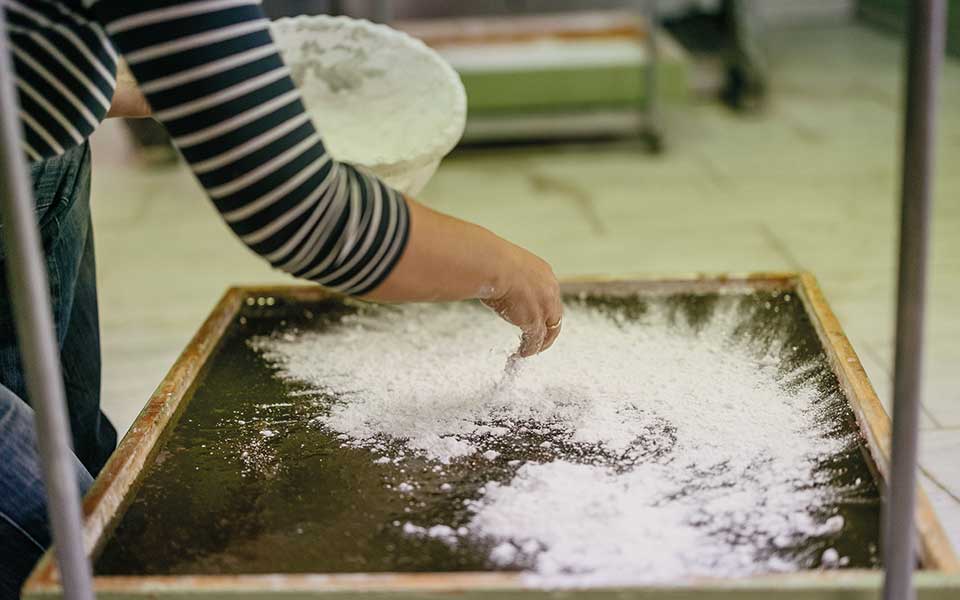
© Angelos Giotopoulos
A Family Affair
While dozens of artisans once produced it, only six family-run workshops today continue the tradition of handmade loukoumi: those of Sikoutris, Livadaras, Korres, Kanakaris, Denaxas, and Georgiou. These businesses, now managed by third- and fourth-generation artisans, use well-worn copper cauldrons to produce loukoumi in small batches to ensure its freshness. The process involves boiling sugar, water, starch, and citric acid for an hour and a half while mixing continuously, then adding flavors and often small, thin-skinned Greek almonds before the mixture is poured into flour-lined trays to set for 24 hours. The set loukoumi is then cut and dusted with powdered sugar.
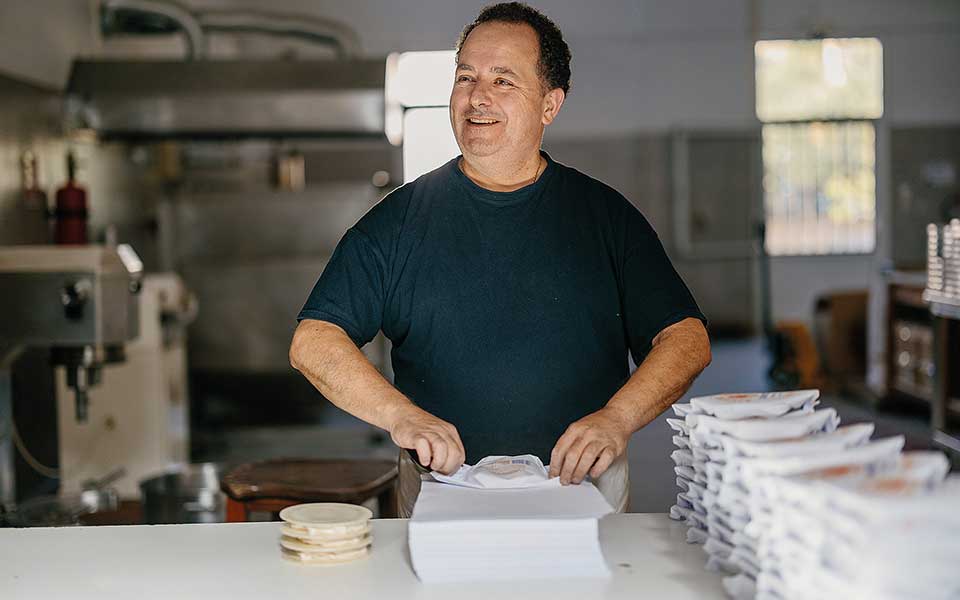
© Angelos Giotopoulos
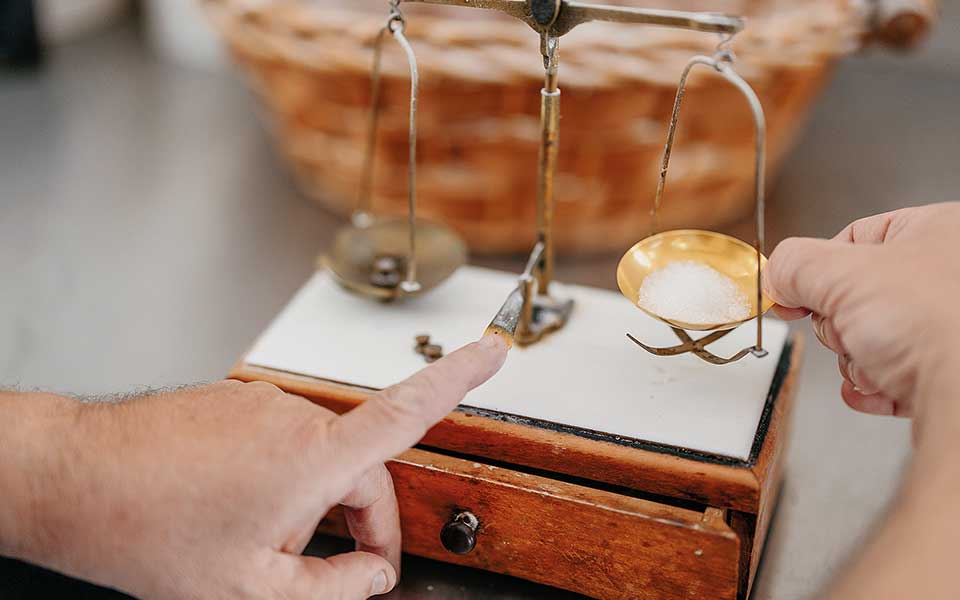
© Angelos Giotopoulos
Classic Flavors and Nostalgic Scenes
The classic flavors remain the most popular: rose, bergamot, and Chios mastic, with or without almonds. Other varieties include walnut and honey, coconut, lemon, vanilla, and rose sugar with almonds.
A cherished image at the Syros port is the sight of kalathatzides (basket-bearing vendors) dressed in white boarding the visiting ferries to sell their loukoumi and halvadopita (nougat pies). Some of these vendors are producers themselves, selling their freshly produced treats in the short time between each ship’s arrival and departure. In Ermoupolis, loukoumi and halvadopita are also available at workshops’ retail spaces, grocery stores, wine shops, and supermarkets.
The two oldest workshops on the island are those of Livadaras, founded in 1923 by the refugee Antonis Livadaras, and Sikoutris, established in 1928 by Georgios Sikoutris who was displaced from Smyrna. The Korres workshop, started by Vasileios Korres in 1967, was later sold to family friends Yiannis Vamvakousis and Yiannis Sampsonidis. Denaxas Loukoumi, founded in 1972 by Maria Denaxa and her husband Panagiotis, is now run by their godson, Yiannis Angelikas. Kanakaris Loukoumi, established in 1952 by Panagiotis Kokkalis, is now managed by his grandson Kostas. A more recent addition is the workshop of the Georgiou family, located on the hill of Vrontado.












